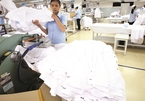 |
Textile workers at the Hue Textile Garment JSC. The China-US trade war will likely result in Viet Nam's textile industry missing its US$40 billion export target for 2019. |
Viet Nam’s textile industry faces many difficulties with both export and production on the decrease due to effects of an intensified China-US trade war, said industry experts.
“Buyers are concerned with the on-going China-US trade war and it has resulted in fewer and smaller orders,” said a report by the Ministry of Investment and Planning.
Vietnamese textile companies were being hit hard as the trade war dragged on, as indicated in a performance review of the Vietnam National Textile and Garment Group (VINATEXT), one of the largest in Viet Nam.
Export of raw materials to China, traditionally a major market for Vietnamese products that accounts up to 60 per cent of the country’s total export volume, plummeted as China cut back on imports. Among the most affected was yarn export with the price continuing to fall as fears of further tariffs being slapped on an additional US$250 billion worth of Chinese goods linger.
“As the global yarn industry faces worsening prospects due to the on-going trade war, competition among rival countries such as India, Indonesia, Pakistan, Thailand and Viet Nam has intensified,” said the review.
In stark contrast to last year when there were more than enough orders to work on until the end of the year by September, companies are scrambling to secure orders to maintain production.
A vast majority of orders, if they were signed at all, were of small volume and short-term as customers were constantly on the look-out for new developments of the trade war. In addition, more and more Chinese orders have been shipped to countries with better tax incentives such as Cambodia and Bangladesh.
The possibility of Viet Nam’s textile industry hitting its target of $40 billion in exports this year is getting slimmer, said VINATEXT Vice President Truong Van Cam.
Along with the trade war’s adverse effects, expectations for trade deals such as the Comprehensive and Progressive Agreement for Trans-Pacific Partnership (CPTPP) and the EU-Viet Nam Free Trade Agreement (EVFTA) were set unrealistically high, Cam said, adding such deals will take a while to make a real impact.
According to figures released by the General Department of Customs, textile exports during the first three quarters of 2019 reached $29.2 billion, a 9.1 per cent year-on-year increase. — VNS

Vietnam strives for sustainable textile & garment industry
The textile and garment industry is the second biggest polluting industry. Textile factories are the most energy-intensive in the world, consuming 1/10 of the total electricity used by industries in Vietnam.

Localities fear pollution from textile and garment industry
Many cities/provinces reject textile and garment projects because of fear of the negative impact on the environment.
 The possibility of Vietnam’s textile industry hitting its target of $40 billion in exports this year is getting slimmer." itemprop="description" />
The possibility of Vietnam’s textile industry hitting its target of $40 billion in exports this year is getting slimmer." itemprop="description" />